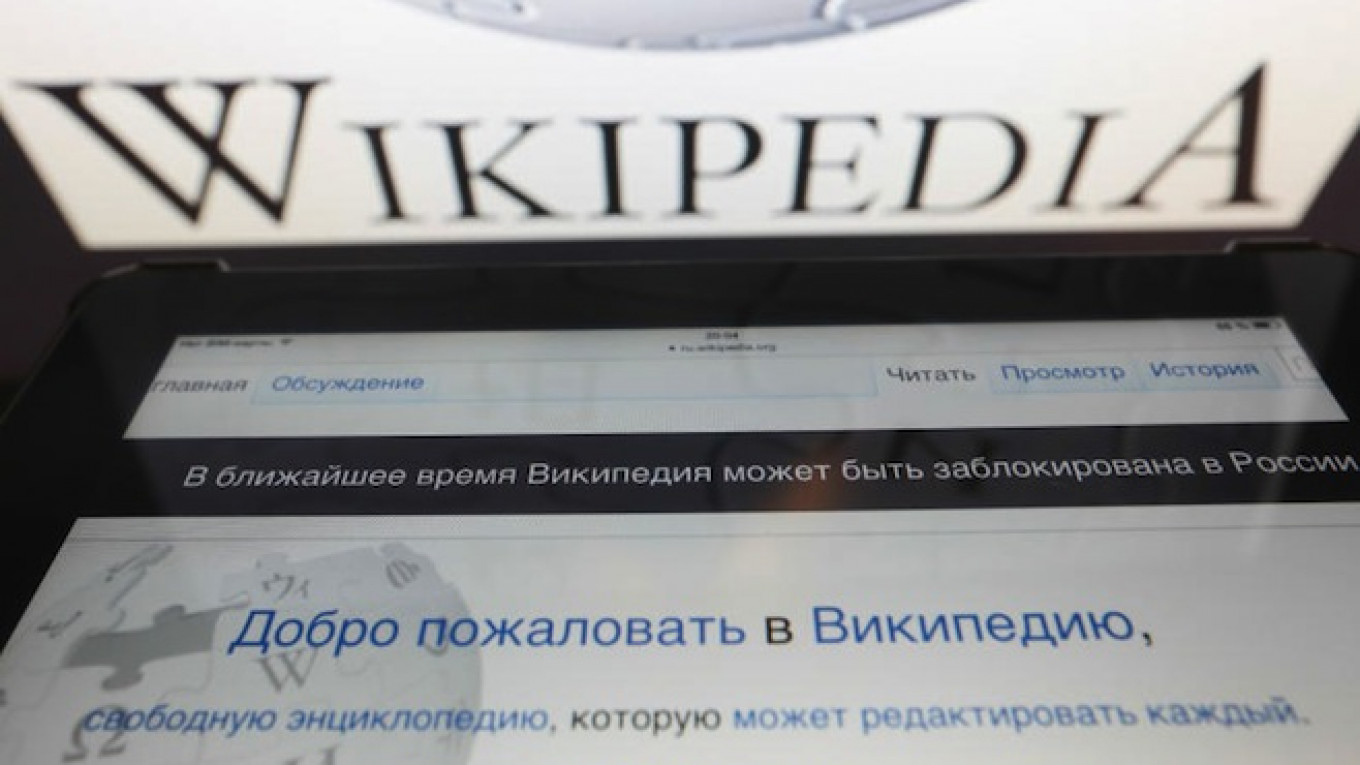After blocking a Wikipedia article for less than than 18 hours, the Russian media watchdog Roskomnadzor removed it from a list of banned webpages on Tuesday in a move that reflects the power the Russian state wields over the Internet, pundits told The Moscow Times.
At the end of July, a local court in the southern Astrakhan region declared that a Wikipedia article on charas — a form of hashish — violated the Russian law that forbids dissemination of information on how to make, buy or use drugs.
On Thursday, Roskomnadzor warned Wikipedia that unless the article be amended and the forbidden content removed, it would have to block the entire online encyclopedia due to its use of a secure communications protocol, which does not allow censors to block webpages selectively.
On Friday, Roskonadzor issued another warning, saying that it seemed “the website's administrators want to be blocked.”
Finally, on Monday the agency declared that it had ordered Internet providers to block the article's webpage. The move provoked outrage among the Internet community that claimed the Russian government was prepared to block a popular international website, used by many ordinary Russians on a regular basis.
According to Stanislav Kozlovsky, one of Wikipedia's administrators and executive director of the? HYPERLINK "http://Wikimedia.ru/"Wikimedia.ru website that oversees the Russian segment of the encyclopedia, the article on charas was changed multiple times in order to adhere to the law.
“On the first day when Roskomnadzor voiced its complaints, the article was changed,” said Kozlovsky in a phone interview.
Moreover, according to Kozlovsky, the agency banned not the charas article, but the disambiguation page for the word 'charas.' On Monday night, Kozlovsky received complaints from people throughout Russia claiming they could not access Wikipedia altogether.
But on Tuesday Roskomnadzor abruptly removed the article from the list of banned resources, saying that the altered article complied with the law.
Roskomnadzor's spokesman could not immediately explain why it had blocked a webpage only to restore access to it less than a day later. During that time the webpage has undergone only minor changes, according to the encyclopedia's records available online.
During the consequent media storm, Roskomnadzor's own Wikipedia entry was translated into new languages such as Spanish and Catalan, according to the encyclopedia's records. The number of Russians visiting the Russian Wikipedia entry on charas reached 100,000 on Monday, a sharp increase from the meager few previously visiting the webpage daily.
Roskomnadzor did not respond to requests for comment by the time of publication. In its online statement, the watchdog said that the decision was made after experts of the Federal Drugs Control Service (FSKN) ruled that the charas article does not violate the law.
According to Artyom Kozlyuk, head of independent online freedom watchdog Roskomsvoboda, authorities in Roskomnadzor, as well as more senior agencies have realized that blocking Wikipedia? differs from blocking opposition blogs and news websites.
“On the one hand they realize that blocking Wikipedia will damage Russia's image, on the other, they had to fulfill their earlier threats in order to save face,” said Kozlyuk in a phone interview.
“Everybody understands that the government can block anything at any point,” he said.
The worrying sign is that this is the first time a court rather than a government agency, ruled to block a webpage, Kozlyuk said.
Vasily Gatov, a visiting fellow at the University of Southern California’s Annenberg Center on Communication Leadership and Policy, has offered a more complex theory.
He said that while Roskomnadzor has demonstrated that it will fulfill orders from its superior commanders in the Kremlin, it still understands that blocking such websites does more harm than good.
“Roskomnadzor has sent a signal to all these officials in the presidential administration that they are essentially idiots,” he said in written comments.
Contact the author at i.nechepurenko@imedia.ru
A Message from The Moscow Times:
Dear readers,
We are facing unprecedented challenges. Russia's Prosecutor General's Office has designated The Moscow Times as an "undesirable" organization, criminalizing our work and putting our staff at risk of prosecution. This follows our earlier unjust labeling as a "foreign agent."
These actions are direct attempts to silence independent journalism in Russia. The authorities claim our work "discredits the decisions of the Russian leadership." We see things differently: we strive to provide accurate, unbiased reporting on Russia.
We, the journalists of The Moscow Times, refuse to be silenced. But to continue our work, we need your help.
Your support, no matter how small, makes a world of difference. If you can, please support us monthly starting from just $2. It's quick to set up, and every contribution makes a significant impact.
By supporting The Moscow Times, you're defending open, independent journalism in the face of repression. Thank you for standing with us.
Remind me later.


